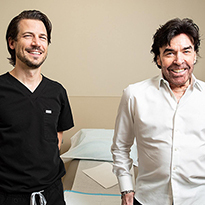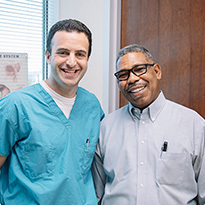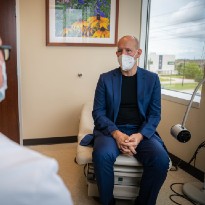A diagnosis of prostate cancer can be confusing, oftentimes leaving men with more questions than answers. What are my treatment options? Which therapy is right for me? What is the prostate cancer prognosis?
Memorial Hermann Cancer Centers bring together cancer-focused specialists in one location to talk with you directly and answer any of your questions. This allows you and your team of cancer specialists to work together in the planning and delivery of your treatment. The team includes:
- Surgeons
- Radiotherapists
- Medical oncologists
- Dietitians
- Nurse navigators (cancer nurse specialists)
Unlike many other types of cancers, there are numerous options for prostate cancer treatment. There is no one definitive course of treatment, and often, a combination of therapies can be the best option.
Traditional and Robotic Surgery
Memorial Hermann offers a broad range of surgical options as an effective method for treating cancer that is confined to the prostate. Once cancer is confirmed, either through a biopsy or pelvic lymphadenectomy (surgical removal of lymph nodes from the pelvic), your doctor may recommend surgical removal of your prostate, surrounding tissues and area lymph nodes. This is known as a radical prostatectomy, and it is available as both a traditional and robotic-assisted surgical procedure.
At Memorial Hermann, our experienced surgeons currently provide three surgical approaches for prostate cancer treatment. The stage of cancer, along with your individual medical history, will determine the most effective approach for your specific situation. The three surgical approaches include:
- Retropubic Prostatectomy is a traditional surgical procedure where an incision is made in the abdominal wall and the prostate is removed. Area lymph nodes may also be removed.
- Perineal Prostatectomy is a similar traditional surgical procedure, but instead the incision is made in the perineum (area between the scrotum and anus) and the prostate is removed. Area lymph nodes may also be removed.
- Robotic-Assisted Radical Laparoscopic Prostatectomy is a new, less invasive approach to prostate removal surgery. This robotic-assisted procedure allows surgeons to perform a very precise, nerve-sparing operation using only five small incisions. By using this advanced technology, the chances are greater that you may see a more complete eradication of cancer, as well as retention of bladder control and sexual potency.
Advanced Radiation Therapies
Radiation therapy may be used as the sole form of treatment for early stages of prostate cancer or for those patients who are not candidates for surgery. Radiation therapy may also be used in addition to surgery in more advanced stages.
Memorial Hermann offers advanced radiation therapies for qualified patients which can dramatically reduce damage to surrounding healthy tissue. Forms of therapy are dependent upon the prostate cancer stages and the intended purpose of treatment, and include:
- For external beam radiotherapy treatments such as Intensity-Modulated Radiation Therapy (IMRT), a linear accelerator is used to deliver beams of high-energy X-rays directly to the site of a tumor. IMRT uses a state-of-the-art system to precisely shape radiation beams to the shape of the tumor.
- High dose radiation (HDR) therapies such as brachytherapy are a type of internal radiation treatment that involves the implantation of a low-dose radioactive source (or seed) into or near the prostate. Depending on your course of treatment, this implant may be temporary or permanent.
Chemotherapy
According to the American Cancer Society, chemotherapy is not considered standard treatment for early-stage prostate cancer. However, it remains an option for patients with cancers that have not responded well to hormone therapy or other treatments, and chemotherapy may be paired with prostate cancer surgery to increase the overall likelihood of success.
The affiliated medical oncologists at Memorial Hermann have experience with treating many different types of cancer using advanced chemotherapy treatments , and we offer both inpatient and outpatient chemotherapy services at convenient locations all across the Greater Houston area.
Potential Side Effects of Prostate Cancer Treatment
While advances in prostate cancer treatment have helped reduce the severity and frequency of side effects, there is still a chance that you may experience a few of the following common side effects related to prostate cancer treatment:
- Incontinence and urinary dysfunction
- Bowel dysfunction
- Erectile dysfunction
- Infertility
- Depression
- Fatigue
The probability of experiencing side effects depends on a few factors, including the type of treatment, severity of prostate cancer and your overall level of health. It’s important to maintain a healthy lifestyle and positive attitude in order to improve your chances of a positive treatment outcome. Your urologist can give you more specific information about possible side effects and how they may impact you and your family.
Why Choose Memorial Hermann for Prostate Cancer Treatment?
To get checked for prostate cancer, schedule an appointment with your regular physician today. If you need a physician, Memorial Hermann can help you find one.
For more information about Memorial Hermann Cancer Centers, including how to get connected to our support services or an affiliated provider, call (833) 770-7771 or fill out the form on this page to be connected to one of our Oncology Nurse Navigators.





